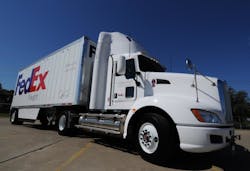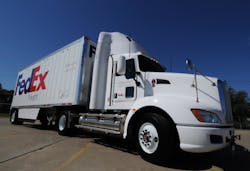“Natural gas is ripe today for use in the close to 10,000 trucks and buses in the New York City, Long Island and New Jersey region and the 10 million of these workhorse vehicles nationwide,” noted Joanna Underwood, Energy Vision’s president, in the report.
“Shifting these fleets – just 4% of all vehicles in the U.S. – away from diesel would have a dramatic impact; eliminating almost a quarter of all petroleum-based highway fuel consumed a year,” she added.
Underwood also noted that the use of natural gas-powered garbage trucks increased ten-fold over the last five years – a shift that’s eliminated the need for 4.52 million gallons of diesel fuel, producing significant fuel cost savings of from $4.5 to $6 million a year.
Yet Underwood and report co-author Matt Tomich argue that there are other factors at work that could ramp up this shift to natural gas. One is that natural gas engines now offer more power and torque compared to previous models – indeed, in many cases almost diesel-equivalent power and torque.
[The overview of the new natural gas fired Cummins 12 liter ISX G engine offers a case in point. Important editor’s note: the natural gas is NOT injected into the engine as the video states; rather it ‘flows’ into the engine.]
And when diesel engine emission control technology required by strict Environmental Protection Agency (EPA) mandates are factored in, the significantly higher $50,000 to $70,000 premium for natural-gas fired heavy trucks is in many cases being cut in half, the report’s authors argue.
Yet the report also touches on another issue critical issue in the diesel vs. natural gas debate: hydro-fracking, the process by which water and sand is injected into the earth to loosen and recover natural gas deposits.
“Only with the EPA and Department of Interior playing a stronger leadership role in clarifying the impacts of the fracking industry, with regard to materials and water use, waste handling and processing, and in setting standards based on state-of-the-art practices,” Underwood and Tomich said. And only with such measures in place “will public confidence grow” in using natural gas more widely as a vehicular fuel, they argued.
Yet there’s another potential source of natural gas to tap as well, they pointed out: the renewable form produced made from organic wastes and landfill decomposition, which requires no drilling, generates virtually no particulate emissions and is close to carbon neutral.
And if gaseous vehicle fuel can be produced in significant quantity from landfill waste … that right there could change the truck fuel debate for good.

